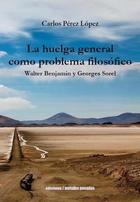
The strike presupposes a practice, a lived experience. The same could hardly be said of the general strike, understood in its revolutionary idea: the universal cessation of all work, everywhere at the same time. Investigations into the general strike give an account of the problem which arose for historians to conceive of it as a verifiable fact, for the actual trace of their mythical expectation only reached imminence. In the early twentieth century, this way of approaching the country generated a debate about its potential as a threatening tool for political ends or as an authentic means for a revolutionary time. This is precisely the plot in which Georges Sorel appears in his Reflections on Violence, later taken up by Walter Benjamin in his essay "For a Critique of Violence." The philosophical problem of the general strike thus appears in the reconstruction of these trajectories, b...read more






